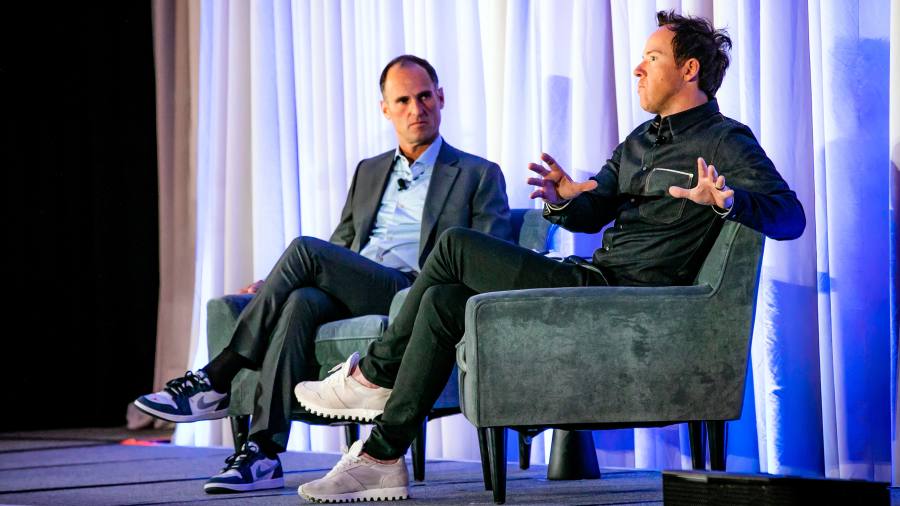Receive free Silver Lake Group LLC updates
We’ll send you a myFT Daily Digest email rounding up the latest Silver Lake Group LLC news every morning.
Silver Lake is concentrating its investments on “big all-in bets” as one of Wall Street’s most closely followed investors raises the ambition of its dealmaking operations amid expectations that more volatile markets will unearth large opportunities.
Egon Durban, co-chief executive, said the $98bn-in-assets technology-focused private equity group had decided to focus on fewer but larger investments such as its $12.5bn takeover of software company Qualtrics that closed on Wednesday morning.
“If you see us invest right now, by definition it will be a big all-in bet,” Durban told the Financial Times in a rare media interview. “You’re going to see us do . . . a handful or two of large, really important investments a year and that’s it.”
Durban’s comments contrast to many of Silver Lake’s main private equity rivals who are focusing on smaller deals after rising interest rates have led to a sharp slowdown in deal activity. But he said the tightening financial conditions had presented opportunities to back tech companies that were previously out of reach for private equity buyers.
“Our greatest successes as an institution have been when we are big in terms of capital and in firm resources committed,” he said.
Silver Lake’s €2.4bn move to take over Software AG, one of the largest technology companies in Europe, progressed this month after a rival bidder withdrew their effort.
Silver Lake first invested more than $500mn in Qualtrics, which invented specialised software analytics tools that help companies respond to online customers, during the tech group’s 2021 initial public offering. Qualtrics shares soared to give the company a near $30bn valuation in the months after the listing but fell by about two-thirds last year.
That gave the buyout group the opportunity to assemble a takeover having already held a large public shareholding and representation on Qualtrics’ board. Durban had also grown close to Qualtrics founder and chair Ryan Smith and its chief executive Zig Serafin, who will continue to run the company.
Silver Lake in March agreed to pay $18.15 a share for Qualtrics, valuing it at $12.5bn, or about 40 per cent below its IPO price. The deal was finalised as markets unravelled during the failure of Silicon Valley Bank and as other potential bidders bowed out. Silver Lake arranged a large equity cheque to get the takeover done without requiring heavy debt financing.
Silver Lake and its investors committed about $9bn in cash to fund the buyout. CPP Investments, Canada’s largest pension fund, invested a further $1.75bn, while just $1.2bn of the purchase price was financed with debt. The lack of leverage has made Qualtrics the single largest investment in Silver Lake’s near quarter-century history.
Silver Lake said on Wednesday it had also raised $500mn for the Qualtrics deal from venture group Accel and $250mn from BDT & MSD Partners, the private capital group co-founded by former Goldman Sachs banker Byron Trott and computer billionaire Michael Dell, who himself is investing $250mn.
Ryan Sweeney, a partner at Accel, which backed Qualtrics as a start-up, called the deal “as close to a no-brainer as can be”.
“It is unusual for us to invest alongside another firm but we have a special relationship with Silver Lake,” said Gregg Lemkau, co-chief executive of BDT & MSD, which manages more than $50bn in assets for founders and family business owners.
Durban helped BDT & MSD co-founder Michael Dell privatise his eponymous personal computer company in 2013 in a hotly contested deal. The wildly successful buyout burnished Silver Lake and Durban’s reputation for working with founders to transform their businesses.
“Qualtrics was sitting in plain sight,” said Durban. The tech company’s majority owner, German software group SAP, announced plans to divest its investment earlier this year, spurring heavy private equity interest.
Smith will make a large investment in Qualtrics and is expected to take an active role in expanding the business through acquisitions and heavy investment in new technologies.
“At our size, these platforms don’t come up with the ability to be taken private very often, or almost ever,” he said. Characterising the deal’s lack of leverage as appealing, he added: “We won’t have to work the first 15 days of the month to make our next interest payment.”
Read the full article here




